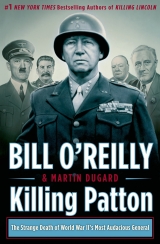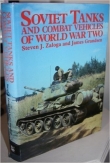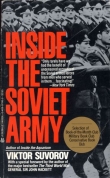
Текст книги "Killing Patton"
Автор книги: Bill O'Reilly
Жанр:
Военная история
сообщить о нарушении
Текущая страница: 14 (всего у книги 25 страниц)
17
BERLIN, GERMANY
APRIL 1, 1945
NIGHT
Nobody stands as Adolf Hitler enters the conference room.
The Führer’s entire body quivers as he assumes his usual place before the war map table. Hitler’s hands shake, his head nods uncontrollably, and he is bent at the waist, too weak to stand upright. The distant thunder of Allied bombing shakes the concrete walls. Yet the Führer’s eyes shine brightly behind his rimless pale green spectacles, showing no fear as he gazes down at the current location of his armies. Most of them, however, are not real, though he is too deluded to know the truth. In his desperation to end the war on his terms, Hitler imagines nonexistent “ghost” divisions as he scrutinizes the map, and pictures thousands of Panzers in places where there are none at all.
Meanwhile, private conversation hums as if the Führer has never even entered the first-floor room. German officers and Hitler’s secretaries gossip and chitchat as if the most feared man in the world were not in their presence.1
An Allied bomb explodes nearby. Lights sway, flickering temporarily, then return to full strength. All talk ceases. The military officers know better than to appear afraid, while the secretaries train their eyes on Hitler, waiting for his response.
“That was close!” Hitler says to no one in particular.
Weak smiles fill the room, as yet another sign of defeat enhances the awkward sense of community. Just weeks ago such informality would have been an unforgivable lapse in protocol, but being fifty feet underground is taking its toll on Hitler’s staff. They live like a cave-dwelling prehistoric Germanic tribe, in a world where the walls are made of hard rock. The cement corridors are narrow, painted the color of rust, and the ceilings low. The rooms are all painted a dull gray, and the walls weep as moisture seeps through the rock. They have their own water supply, thanks to a deep artesian well. A sixty-kilowatt diesel generator provides energy for the switchboard, lights, and heating. The air comes from up above, through a filter to ensure its purity.
Yet the bunker is hardly pleasant. There are three separate security checkpoints just to get in, and all entrances are manned by security guards carrying machine pistols and grenades. In this way, Hitler’s headquarters is, in fact, a prison.
“The whole atmosphere down there was debilitating,” one German soldier who served in the bunker will later remember. “In the long hours of the night it could be deathly silent, except for the hum of the generator … Then there was the fetid odor of boots, sweaty woolen uniforms, acrid coal-tar disinfectants. At times toward the end, when the drainage backed up, it was as pleasant as working in a public urinal.”
The bunker’s residents can hear the air-raid sirens at ground level, but rarely go up to the garden to feel the sun on their faces. The Führer has banned smoking in the bunker, but breathing dank air that is fouled all too often by the Führer’s meteorism is an ordeal for all. As of late, the group has become so used to the sight of their Führer that even the lowest-level staffers no longer feel the need to cut short their conversations when he is in their presence.
Yet the informality belies the truth: everyone, with the exception of Adolf Hitler, is terrified. “You felt it to the point of physical illness,” one German officer will later write. “Nothing was authentic except fear.”
And yet Adolf Hitler is convinced that the war can still be won.
Aboveground, the Allies are bombing around the clock: the American Army Air Corps in the daylight and the British Royal Air Force by night. Berlin is a city in ruins. Of its 1,562,000 homes and apartments, one third have been completely destroyed. Almost 50,000 citizens have died, repaying the butcher’s bill of the German bombings of London five times over. The people sleep most nights in cellars or subways. Still, despite the mayhem, there is an amazing sense of routine to life on the streets of Berlin: mail is delivered each day, the Berlin Philharmonic performs at night, and the subway runs on time. Bakeries open their doors each morning, ensuring that the beleaguered populace can purchase their daily brot. And despite the drone of RAF Lancaster bombers, the bars are jammed each night with Nazi bigwigs and those businessmen wealthy enough, and lucky enough, to have escaped military service. The gossip, as always, centers on the bombing: who died, who lost their homes, whose job no longer exists because their place of business was been reduced to rubble.
One quiet reality, however, pervades life in Berlin: the city is mostly female. Able-bodied men have been called away to war. The Russian army is now less than forty miles from Berlin; refugees pouring into the capital from the east, seeking to escape these brutal oppressors, tell horror stories of murder and rape. They talk of a pamphlet that has been distributed to the Russian troops through Joseph Stalin’s propaganda ministry, directly threatening Germans of all ages, particularly women.
“Kill! Kill!” the leaflet reads. “Follow the precepts of Comrade Stalin. Stamp out the fascist beast once and for all in its lair! Use force and break the spirit of Germanic women. Take them as your lawful booty. Kill! As you storm onward, kill! You gallant soldiers of the Red Army.”
While some wealthy Berliners are secretly making plans to flee the city and perhaps find sanctuary in Switzerland, most citizens are stuck. They cannot run. So they remain through the bombings, going about their business as best they can.
The turning point of the war between the Russians and Germans took place in the city of Stalingrad. The fierce battle lasted for five and a half months, and saw the death of 1.2 million Russian soldiers and civilians and 850,000 German dead or wounded. The fighting was often in close quarters, within the houses and buildings of the city itself. The Germans were ruthless in their treatment of the Russian populace, murdering and raping with impunity.
Eventually, the German Sixth Army was cut off from supplies. German general Friedrich von Paulus implored Hitler to let his army withdraw. The Führer refused. This resulted in ninety-one thousand Germans being taken prisoner when the battle came to an end on February 2, 1943. Of that number, only six thousand survived the cruelty of their Russian captors and returned home alive after the war. From then on, the Soviet army steadily advanced westward, vowing to avenge the atrocities that the Germany army had inflicted upon the people of Russia.
The residents of Berlin will bear the brunt of this vengeance. They can only pray that the stories of rape and murder are mere rumors.
But those prayers will go unanswered.
* * *
On March 16, in a special ceremony, Hitler awarded Joachim Peiper and Otto Skorzeny the Oak Leaves to the Knight’s Cross. But his two favorite soldiers are soon to fight no more. In Vienna, Peiper and his SS Panzer division have been defeated and disgraced in a last-ditch attempt to stop the Russian advance. Furious, Hitler has ordered that Peiper and his men remove from their uniforms the armbands bearing his name. Shortly after that, Peiper flees west and is captured by the Americans.
Skorzeny, a native of Vienna, hears that the Russians are about to enter the city and races there on April 10 with a team of commandos. He finds Vienna in flames, but otherwise dark. Instantly recognizing that the city will fall by morning, he and his commandos retreat. Their war is over. Skorzeny orders his men to hide themselves, while he escapes into the Alps, where he vacillates between committing suicide and fleeing Germany while he can still get out alive.
Like Adolf Hitler, Skorzeny is planning a way to end the war on his terms. In time, he will surrender to the Allies.
* * *
In the pale artificial light of the bunker, Adolf Hitler continues to stare, hour after hour, at his map table, waiting for some sign of hope that all will soon be well. “Think of Leonidas and his three hundred Spartans,” he tells his personal secretary, the despicable Martin Bormann. “It does not suit us to let ourselves be slaughtered like sheep. They may exterminate us, but they will not be able to lead us to the slaughter.”
Thus the Führer has begun a scorched-earth policy designed to deprive Germany’s approaching conquerors of a form of sustenance. His “Nero Command” of March 19 states, “All military, transportation, communications, industrial, and food supply facilities, as well as all other resources within the Reich which the enemy might use either immediately or in the foreseeable future for continuing the war, are to be destroyed.”
This is all Hitler can do: prepare for the end.
Hitler passes the time in the bunker, sleeping most days and then staying up until dawn most nights to scrutinize plans for battles that will never be fought. His palsied tremors make it impossible for him to turn the pages of a book, so he commands that his propaganda minister, Joseph Goebbels, read aloud to him from Thomas Carlyle’s biography of Frederick the Great, the eighteenth-century Prussian warrior king who has always been an inspiration to the Führer.
Hitler specifically chooses Carlyle’s book because it was the eminent Scottish historian who set forth the “Great Man” theory of history, which states that “the history of the world is but a biography of great men.”
Leonidas was a great man.
Frederick was a great man.
Hitler considers himself a great man.
Reclining on the bed in his personal quarters as Goebbels sits in a nearby chair, Hitler is calmed by words that make a vivid comparison between Frederick’s times and his own situation. It is a passage describing the winter of 1761/62, when all seemed lost during the Seven Years’ War. Frederick had few allies at the time, and was also facing a multinational force that threatened to annihilate his Prussian troops.2 Hitler is now himself facing Armageddon. Russian troops are poised to enter his capital city.
“The great king did not see any way out, and did not know what to do. All his generals and ministers were convinced that he was finished. The enemy already looked upon Prussia as vanquished,” Goebbels reads. “If there was no change by February 15, he would give up and take poison.”
Goebbels pauses. Hitler is utterly silent.
Then comes the advice Hitler is hoping for, delivered down through the ages from Frederick, through Carlyle. “Brave king, wait but a little while. The days of your suffering will be over. Behind the clouds the sun of your good fortune is already rising and soon will show itself to you.”
Goebbels closes the book. He need read no further. Adolf Hitler, a man who believes in signs, knows that the universe is telling him not to give in.
The Führer begins to weep.
* * *
Just days later, Adolf Hitler receives yet another sign that Germany can still win the war. He summons all his top generals and ministers to the bunker to show them the news. “Here, you never wanted to believe it,” he crows, distributing the report that he has just received.
The bunker erupts in cheers.
The news could not be more shocking: Hitler has prevailed over one of his biggest opponents.
American president Franklin Delano Roosevelt is dead.
18
THE LITTLE WHITE HOUSE
WARM SPRINGS, GEORGIA
APRIL 12, 1945
1:00 P.M.
The president of the United States looks defeated. Sitting placidly near the French doors of his small vacation cottage, Franklin Roosevelt is trying to appear authoritative for the artist painting his portrait. He is failing.
Elizabeth Shoumatoff’s paintbrush moves back and forth from palette to canvas, trying to capture the sixty-three-year-old president’s image for posterity. But the task is difficult, as the president looks far older than his age.
FDR is exhausted from twelve years in office and the incredible burden of world war. Still, he soldiers on. His hands shake with a feeble palsy, forcing him to press his fountain pen firmly against the documents he is trying to sign as his portrait is being drawn.
Sitting in an alcove across the room, gazing adoringly at the president, is his longtime mistress, fifty-three-year-old Lucy Mercer Rutherfurd. Her husband, a prominent New York socialite nearly three decades her senior, has just died. But even while he was alive, Lucy and FDR carried on a thirty-year relationship. “He deserves a good time,” his cousin Alice Roosevelt once remarked of their affair, “he’s married to Eleanor.”
It was British prime minister William Gladstone who said that the Eleventh Commandment for politicians is “Thou shall not get caught.” The affair between Lucy Mercer Rutherfurd and FDR adheres to that adage. Way back in 1918, Roosevelt promised his wife, Eleanor, that he would banish Lucy from his life—but that has not happened. Lucy is a tall, striking brunette with blue eyes and a flirtatious, fun-loving personality that is the polar opposite of Eleanor’s prudish and critical one. Lucy is often by FDR’s side when he travels outside Washington, and Secret Service agents clandestinely spirit her into the White House at the president’s order.

Lucy Mercer Rutherfurd
Roosevelt arrived here at his beloved vacation home almost two weeks ago. This marks the forty-first time he has come to Warm Springs since taking office. When he boarded the Ferdinand Magellan for the overnight train ride from Washington down to Georgia, he was shrunken from weight loss. His face was pale and gray from exhaustion. His heart condition has worsened since his inauguration three months ago—in fact, FDR’s health has declined so rapidly that Vice President Harry Truman is amazed that the president continues to take on so much work.
Suddenly, the artist Shoumatoff sees a crimson flush filling Roosevelt’s cheeks. She has been struggling all morning with ways to make the president appear more youthful and robust, and is amazed at this instant change in his skin tone. The Russian-born painter reaches for the proper shade of red to capture this new ruddy glow.
What she does not know is that the president of the United States is in the early stages of a cerebral hemorrhage. Chronic hypertension brought on by years of smoking and lack of physical exercise has burst an artery in his brain. The surrounding tissue in his skull is now drenched in blood. There is no way to stanch the bleeding.
Roosevelt lurches, waving his right hand in the air. His left hand, like that entire side of his body, is now paralyzed. His face looks almost childish, as if the most powerful man in the world were lost and needed help finding his way.
“I have a terrific pain in the back of my head,” he moans.
The president’s eyes close. His head spills forward. FDR’s trademark, that chin that so many cartoonists have drawn at a jaunty, uplifted angle, now settles atop his chest.
Roosevelt is immediately carried into his small bedroom by a butler and FDR’s longtime valet, Arthur Prettyman. His blood pressure soars to 300 over 190. In a scene reminiscent of the death of Abraham Lincoln, a team of doctors soon arrives and begins to work feverishly to save him.
They fail.
At 2:15 p.m. Lucy Mercer Rutherfurd knows she must leave. She motions to Elizabeth Shoumatoff. “We must pack up and go,” Lucy tells the painter. “The family will be arriving by plane, and the rooms must be vacant.” She packs quickly, says good-bye to FDR one last time, and is out the door by 2:30.
At 3:35 p.m. the doctors labor no more.
FDR is gone.
* * *
Ninety minutes later, in Washington, Harry Truman walks into Speaker of the House Sam Rayburn’s private office for a quiet glass of Old Grand Dad bourbon on the rocks. But Truman will have to hold off on that drink. An urgent message is waiting from White House press secretary Stephen Early, asking him to come to the White House as quickly as possible.
Truman leaves in such a hurry that he loses his Secret Service detail.1 Once at the White House, he is led upstairs to the presidential residence, then immediately into Eleanor Roosevelt’s study. Hundreds of framed photographs cover the walls of the enormous room. The First Lady sits on a chair, dressed in black, her face lit by the afternoon sun shining in through the two great windows. She was at a lunch, listening to a piano performance, when, like Truman, she received a call asking her to return to the White House.
She and her daughter, Anna, changed into black mourning dresses.2 Eleanor then broke the news by cable to the Roosevelts’ four sons, who are off serving in the military. Now she must break the news to the vice president that the man to whom she has been happily, and unhappily, married for forty years is dead.
Truman has no idea why he has been summoned. At first Eleanor gives nothing away. She was raised never to display emotion publicly, and is outwardly calm as he steps into the room. Her black dress provides the only clue as to what she is about to say. The First Lady walks to the vice president and tenderly places a hand on his shoulder.
“Harry,” she informs him, “the president is dead.”
Truman is shocked. “I had been afraid for some weeks that something would happen to this great leader, but now that this had happened I was unprepared for it,” he will later recall.
Emotional as always, Truman fights back tears. The death of FDR is stunning, but not as much as the terrifying realization that he is now president of the United States.
“Is there anything I can do for you?” Truman asks, remembering his manners.
Eleanor Roosevelt looks hard at Harry Truman. “Is there anything we can do for you?” she says. “For you are the one in trouble now.”3
* * *
Three thousand miles to the east, George Patton is just finishing his daily journal entries. The hour is late, but today has been extraordinary, and he needs to put every last detail on paper before going to bed. Finally, he closes his journal and puts down the pen.
Patton notices that his wristwatch needs winding. So he turns on the radio in the small truck trailer that serves as his field bedroom. He hopes to get the exact time from the British Broadcasting Corporation’s evening broadcast.4 Instead, he hears the shocking news that FDR is no more.
This is the wretched conclusion to what has been the most nerve-wracking day Patton has endured thus far in the war. Just after breakfast, he met with generals Dwight Eisenhower and Omar Bradley at his headquarters in an old Wehrmacht fort in Hersfeld, one hundred and sixty miles east of the Rhine. Together, they traveled to the town of Merkers, where Patton’s army has just made an incredible find.
The three men entered the mouth of a massive cave, where they boarded a flimsy wooden elevator that lowered them two thousand feet into a salt mine. The shaft was pitch black, so once the daylight above them narrowed to a pinprick during the descent, Patton could not see the other occupants of the car. Noting that the elevator was suspended from a single thin cable, he couldn’t help but quip about their plight: “If that clothesline should break,” he joked grimly, “promotions in the United States Army would be considerably stimulated.”
“George, that’s enough,” shot back a nervous Eisenhower; “no more cracks until we are above ground again.”
The purpose of their descent is of worldwide significance. Elements of Patton’s Third Army accidentally discovered the Merkers mine while interrogating local citizens. The bombing of Berlin had forced the Nazis to smuggle their financial reserves out of the Reichsbank and to a place of safety. They chose this inaccessible salt mine. Literally hundreds of millions of dollars in the form of gold bars, currency, and priceless works of art were delivered the two hundred miles from Berlin to Merkers by train, then stored underground. As Patton, Eisenhower, and Bradley stepped off the darkness of the elevator and into the brightly lit cave, they found a surreal scene. Bags of gold and cash stretched as far as the eye could see. Hundreds of paintings and sculptures, including an Egyptian bust of Queen Nefertiti, lined the walls, along with paintings by Titian and Manet. In its way, the gathered wealth signifies the dissolution of the Nazi government. Without money in the capital city of Berlin, it can no longer wage war.
“In addition to the German Reichsmarks and gold bricks, there was a great deal of French, American and British gold currency. Also, a number of suitcases filled with jewelry, such as silver and gold cigarette cases, wristwatch cases, spoons, forks, vases, gold-filled teeth, false teeth, etc.” Patton wrote in his journal.5
Patton suggests to Eisenhower that the gold be melted down into medals, “one for every son of a bitch in Third Army.”
* * *
Later in the day, George Patton’s mood abruptly shifts. The three generals lunch together and then go to tour the newly liberated concentration camp at Ohrdruf, eighty miles east of the Merkers mine. It was Patton’s Fourth Armored Division—the first tanks into Bastogne and the first to reach the Rhine—that found the horrifying site. Unlike Auschwitz, where SS guards were so rattled by the approaching Russians that they fled before executing the inmates, many residents of Ohrdruf were either shot or marched off to the Buchenwald concentration camp. Many were so emaciated and malnourished that the bullet wounds in their skulls had not even bled.
Patton has seen death in many forms during his time in the military. He has seen men blown to pieces and seen others lose their entire faces to exploding shells. But nothing he has ever witnessed prepared him for Ohrdruf. “It was the most appalling sight imaginable,” he will write in his journal.6 A former inmate leads the tour, showing the generals the gallows where men were hanged for trying to escape, and the whipping table where beatings were administered at random. “Just beyond the whipping table,” Patton later wrote, “there was a pile of forty bodies, more or less naked. All of these had been shot in the back of the head at short range, and the blood was still cooling on the ground.”
At one point, Patton excuses himself from the tour and walks off to vomit against the side of a building.
“When our troops began to draw near, the Germans thought it expedient to remove the evidence of their crimes. They therefore used the inmates to exhume the recently buried bodies and to build a mammoth griddle of railway tracks laid on a brick foundation. The bodies were piled on this and they attempted to burn them. The attempt was a giant failure. Actually, one could not help but think of some giant cannibalistic barbecue,” Patton wrote.
“In the pit itself were arms and legs and portions of bodies sticking out of the green water which partially filled it.”
Writing those words should have been the end of the day for Patton, but the sudden news about FDR’s death rates another journal entry. He thought highly of Roosevelt, and doubts that Truman will make much of a president.
Patton and Harry Truman actually fought together during World War I. Truman commanded artillery that protected his armored units in the Argonne Forest. But Patton does not know this. “It seems very unfortunate that in order to secure political preference, people are made vice presidents who were intended neither for the party nor by the Lord to be presidents,” he writes in his journal before turning out the lights well past midnight.
* * *
Eight hours later, in the bathroom of his lavish suite at the Ritz Hotel in Paris, Wild Bill Donovan stands bare-chested, shaving. He arrived from London late last night and went to bed before FDR DEAD, the shortest wire service message in history, shocked the world. Right now, he does not yet know the bad news.
The spy in charge of the Office of Strategic Services last met with President Roosevelt less than a month ago, when FDR consented to give the full weight of his office to the formation of a new national spy organization. Donovan’s future, and that of the fledgling CIA, seemed to be secure. Wild Bill has ordered many politically motivated assassinations—to him, murder is just one of many options in fulfilling a mission. But of late it has been just as important to pursue a policy of political gamesmanship. Donovan is good at that, and his hold on power seems to expand every day.
Donovan’s suite will serve as his headquarters during his time in Paris. As with his London headquarters, at the equally luxurious Claridge’s hotel, here aides and secretaries will stream in and out of the suite throughout the day, bringing Donovan cables and communiqués updating the actions of his ever-growing worldwide network of spies. So it is no surprise when J. Russell Forgan, the New York banker who now serves as the OSS London counterintelligence chief, races into the bathroom while Donovan is shaving.
For Donovan, the news that the president has died is nothing short of a calamity. He grabs a towel, wipes away his shaving cream, and immediately sends a condolence telegram to Eleanor.
Then Wild Bill Donovan sits down on the edge of his bed. It is a bed with a history, for it was used by Hermann Goering, head of the Luftwaffe, when he stayed in Paris during the Nazi occupation. Donovan knows this. But the Nazis are now the farthest thought from his mind. So is Franklin Roosevelt. Right now, the only thing on Wild Bill Donovan’s mind is Wild Bill Donovan. His future appears in jeopardy. Without FDR to back him, his dreams of a postwar spy agency are now in peril.
Half-dressed and half-shaven, Donovan rests his head in his hands. “This is the most terrible news I’ve ever had,” he moans.
Three hours later, he finally rises from the bed. His determination has returned.








